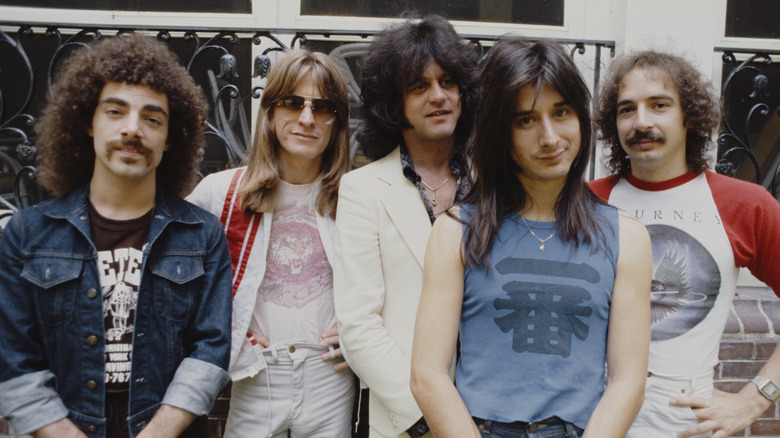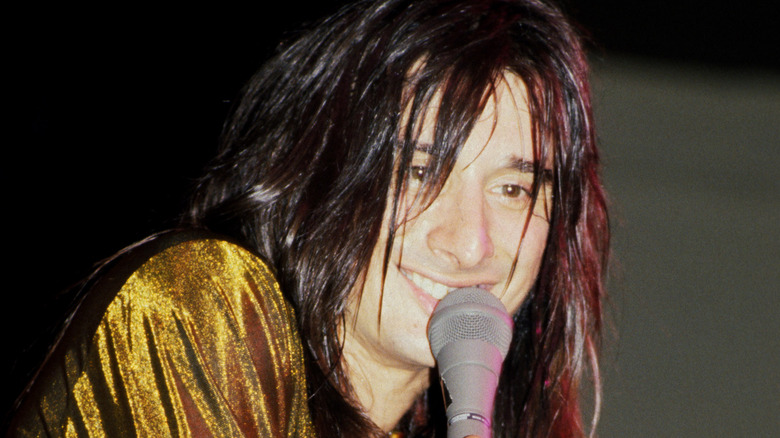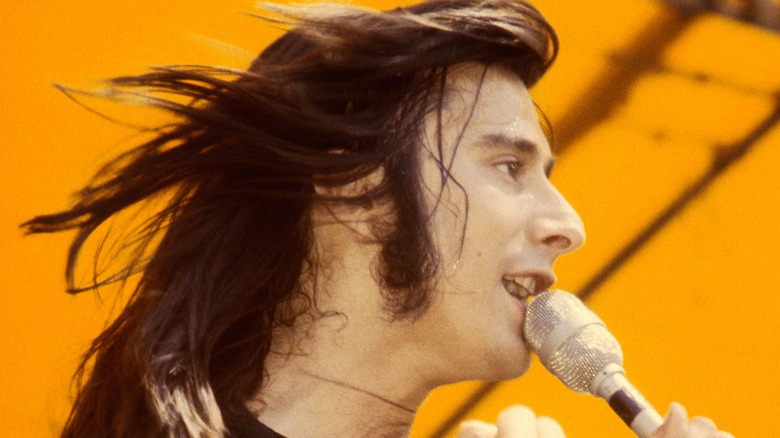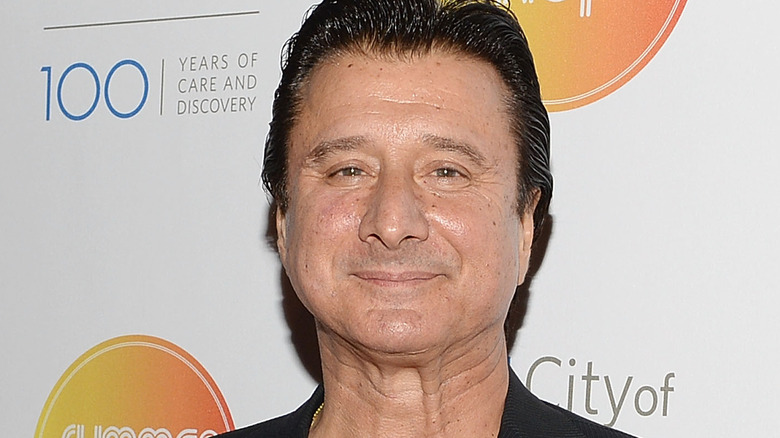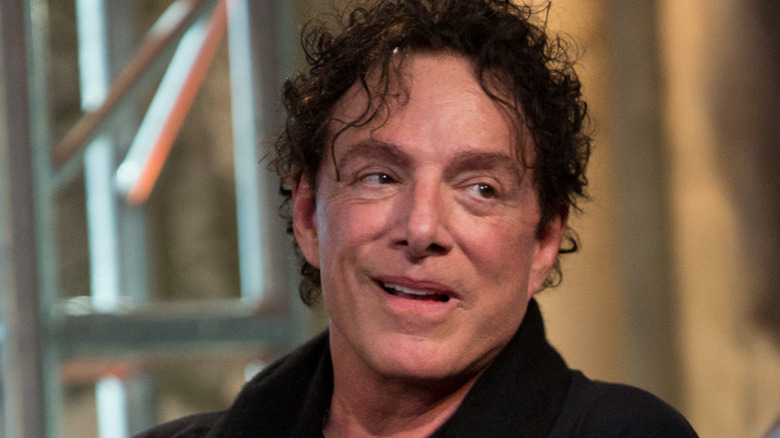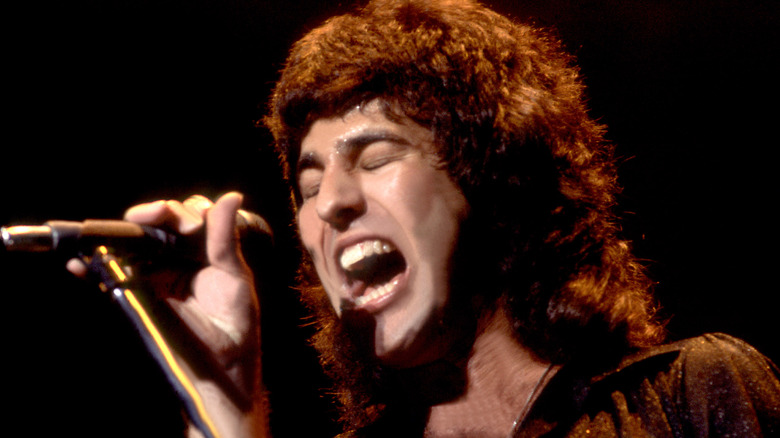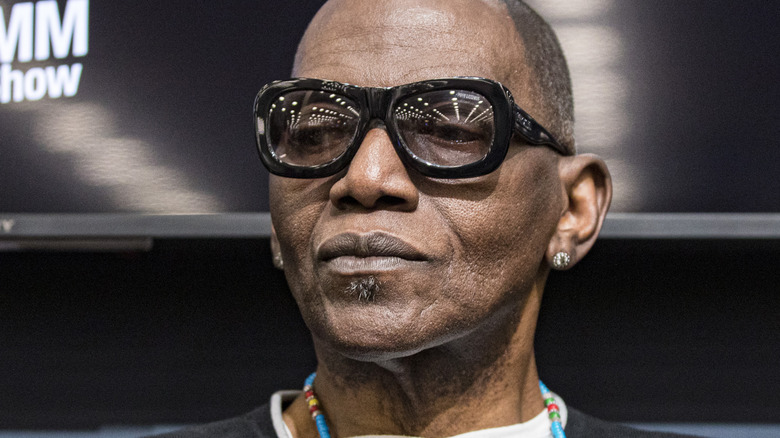Tragic Details About Journey
Now a touring legacy act with many latter-day members, Journey once ruled '70s and '80s arena rock with its hard-charging anthems ("Don't Stop Believing," "Separate Ways") and power ballads ("Open Arms," "Faithfully") alike. Before that iteration, Journey sounded a lot different, a jazzy, progressive-rock collective-meets-supergroup.
Through its 50-year history, Journey has been a musical outlet for a lot of musicians, if not something of a respite for the tragedies and turmoils of their personal lives. The men who played guitars, drums, and keyboards (and sang) in both the prog era Journey and arena rock Journey have dealt with a voluminous amount of heartbreak, health issues, and unfathomable loss. Those sad parts of life have taken a tremendous emotional, physical, and professional toll on the musicians who comprise Journey past and present, including Steve Perry, Neal Schon, Arnel Pineda, Randy Jackson, and Jonathan Cain. Here are all of the horrible things happening to and near the members of Journey while they were busy bringing joy to everyone else.
Steve Perry departed journey for tragic reasons
In 1977, Journey took a radio-friendly route, and after hiring singer Steve Perry, released eight multi-platinum albums in just 10 years. Easily the most successful period in Journey's history, and one that launched a successful solo side career for Perry, it ended when the singer quit the band, to the surprise of his bandmates. "I'm sure they thought, 'Oh, there he goes. Solo career. F*** Steve,'" Perry recalled to GQ in 2008. Actually, he had to step away in order to grieve and to get healthy.
During the creation of Journey's 1986 album "Raised on Radio," Perry's mother died. "So I came home, took care of that, went back, finished the vocals and stuff, and before I know it, we're on tour." After fulfilling those obligations, Perry felt bombarded by the weight of the situation. "I hadn't even addressed or dealt with anything pertaining to that loss. So I was about ready to crash and didn't know."
At the same time, Perry seriously required a break from the tremendous and damaging strain he put on his voice singing Journey songs every night, for months at a time. During the "Raised on Radio" tour, Perry had to resort to doctor-administered shots of B12 and anti-inflammatory agents before heading out on stage. Rather than continue on without their frontman, Journey effectively split up upon Perry's departure.
Mental health and addiction issues also led to Steve Perry leaving Journey
While the need to grieve and rest his frayed vocal cords were reasons enough to leave Journey at the peak of its commercial success — and relentless cycle of recording and touring — in the late 1980s, Steve Perry felt he needed to separate himself from his band because of mental health issues that he feared he was over-treating with the use of substances that he could see getting out of control.
"How do you walk away from something like that? Well, the only reason I did it was because my passion for it, my actual connection to it started to become invisible to singing. I thought, 'What am I? Just a parody of myself now? I'm not connecting to my heart anymore,'" Perry recalled on "Out of the Box with Jonathan Clarke" in 2018. "Back in the days we used to sometimes party a little bit. It would fill your empty heart for a minute, and when you came off of that, guess what? It's worse," Perry said. "I knew it was gonna upset the fans, but I just had to stop."
If you or anyone you know needs help with addiction issues, help is available. Visit the Substance Abuse and Mental Health Services Administration website or contact SAMHSA's National Helpline at 1-800-662-HELP (4357).
Medical issues doomed Steve Perry's return to Journey
After about a decade of dormancy, Journey reunited in the 1990s. In 1996, the group released "Trial by Fire," which featured Steve Perry on vocals (notably on the No. 1 adult contemporary single "When You Love a Woman" and on the rock radio hit "Message of Love"). Despite the animosity surrounding Perry's departure and the band's dissolution, it was Perry who instigated the reunion, contacting each of his old bandmates to smooth things over, rekindle friendships, and get them all involved.
Journey, with its prime-era lineup, was set to tour in support of "Trial by Fire," until Perry suffered a medical emergency on a hike in Hawaii, during a 10-day getaway before rehearsals, according to GQ. "I got to the top of this hill, and I was in trouble. I could hardly walk. I don't know what had happened, but the pain was like an ice pick. I'd had some pain in my left hip area before, but I didn't think nothin' about it." Some tests and doctor consultations revealed that Perry needed a complete hip replacement — which would take him off of any Journey world tour.
Perry allowed the rest of the band to tour, with a sensitive caveat. "Call it the J-Boys. Call it anything. But don't call it Journey, y'know? Because I am gonna get this done, eventually." Instead, they hired a new singer, hit the road as Journey, and it upset Perry so much that it re-fractured the carefully reformed band.
Steve Perry's partner died of cancer
In 2011, Steve Perry accompanied his friend, filmmaker Patty Jenkins, while she edited a segment of a Lifetime documentary about breast cancer, when a shot of a woman caught his eye. Jenkins agreed to set up a date between Perry and the individual, Dr. Kellie Nash, a psychologist dealing with a breast cancer diagnosis. At the time, she'd been in remission for eight months, only for the cancer to return to a Stage 4 level and spread into her bones and lungs. Perry and Nash hit it off. "I never felt like this before, I had finally found her. She's real and right in front of me," Perry wrote on his blog about their profound connection.
The romance developed in 2011 and 2012 as Nash attended radiation and chemotherapy treatments. Two months after receiving a terminal diagnosis, Nash died in December 2012. It took another year and a half for Perry to fulfill a promise he made to his dying partner. "She said, 'Promise me you won't back into isolation, because I fear it would make this all for naught.' I said: 'OK, I promise,'" Perry recalled to The Guardian. In May 2014, he appeared onstage for the first time, singing with his friend Mark Everett's band Eels. That led to the creation of the unsigned Perry's first album in more than 20 years, "Traces." "Doing this has been cathartic for me," Perry said.
Neal Schon has severe tinnitus
In 2012, longtime Journey guitarist Neal Schon was accused of bailing on a Q&A session after a screening of the documentary "Don't Stop Believin': Everyman's Journey" at the Silverdocs film festival. He later explained that he only left so quickly because he couldn't physically handle the event. "I have tinnitus, I can barely hear what the people are saying," Schon told The Washington Post.
Tinnitus is a persistent and sometimes painful medical condition characterized by a regular, if not constant, ringing, buzzing, or whistling sensation, according to WebMD. Because tinnitus, and the permanent hearing damage that goes along with it, develops after prolonged and frequent exposure to loud noise, many musicians who've played hundreds of loud rock concerts receive a tinnitus diagnosis. According to Guitar Interactive Magazine, Schon has to use special equipment to regulate the volume of instruments both onstage and in the recording studio.
Steve Augeri lost his voice
Following Steve Perry's second and permanent exit from Journey in the mid-1990s, the rest of the band moved on with a new singer. Steve Augeri, a crooner who could wail in the Perry style with experience leading Tall Stories and Tyketto, got the job. From 1998 to 2006, Augeri took the stage with Journey and recorded three albums with the band, until he abruptly quit immediately following a sour performance.
According to Melodic Rock, Augeri had difficulty hitting a lot of notes during some 2006 concerts, and before a show in Raleigh, North Carolina, he decided that evening's performance would have to be his last with Journey. He still demonstrated major vocal issues that night, before Journey released a statement announcing Augeri's departure and the arrival of new singer Jeff Scott Soto. Augeri had to exit Journey for health reasons. Near-constant touring left him nearly silent and unable to sing.
"Everyone thinks of the upsides and the glamor and the sparkle and everything that shines," Augeri told Rolling Stone of his Journey years. "But the loneliness and the wear and tear, which is a huge part of it for a vocalist. The thing that would kill me was when we'd do three nights in a row. We would do five shows a week."
Robert Fleischman's wife died of cancer
After some early recordings as primarily a jazzy, progressive-rock, instrumental-focus outfit, in 1977, Journey hired San Francisco musician Robert Fleischman to be its first dedicated lead vocalist. Just months later, after a single tour as the opening act for Emerson, Lake, and Palmer, Journey fired Fleischman and brought in Steve Perry. He'd later sing lead for the bands Channel and Vinnie Vincent Invasion and co-write songs for his former cohorts in Journey, including "Wheel in the Sky" and "Winds of March."
In 2007, Fleischman married the former Michelle Johnson, who in March 2020, died seven years after a breast cancer diagnosis, according to her obituary. "Sorry to tell you, my beautiful wife, Michelle Fleischman passed today," Robert Fleischman said in a statement (via Brave Words). "When she passed church bells from the church down the street played." Michelle Fleischman was 47 years old.
A pediatric cystic fibrosis patient inspired Journey in the '80s
In 1983, shortly after Make-A-Wish International was created to make a dream come true for terminally ill and very sick children, the foundation contacted the band Journey. A young client named Kenny Sykaluk, coping with cystic fibrosis at a facility in Cleveland, really wanted to meet the arena rock group. "We went off to see him. He had no idea how bad he was, but he was dying," Journey keyboardist Jonathan Cain told One One 7 (via Something Else Reviews). "We got to spend the last day of his life with him. He passed the next day, and it stayed with me for a long time." When Sykaluk died, he was holding a Walkman given to him by the members of Journey, which contained a recording of the then-unreleased song "Only the Young."
"When we did VH1's 'Behind the Music,' I was asked about the most powerful things that happened to me as a member of Journey, and it had to be with Kenny Sykaluk on that last day," Cain said. On the band's "Raised on Radio" tour, Journey opened every concert with "Only the Young," played in tribute to Sykaluk.
Aynsley Dunbar's son died of cancer
Drummer Aynsley Dunbar has played with numerous professional rock bands since he was a teenager, including a stint alongside future Fleetwood Mac members John McVie and Peter Green in the star-making John Mayall's Bluesbreakers in the mid-1960s. In 1973, he replaced Prairie Price as the drummer in Journey, when the band was still in its experimental rock fusion phase. Dunbar would be gone from the group by 1978, when it entered its commercially-minded era, and he'd play for bands like Jefferson Starship and Whitesnake, heading into semi-retirement in the early 1990s to spend time with his four young children.
In 1999, per SFGate, doctors discovered a tumor in the brain of the musician's youngest son, Dash Dunbar. The five-year-old's diagnosis was a pontine glioma, a rarely seen mass that attaches itself to and assaults the brain stem, making it virtually impossible to remove, per the Cleveland Clinic.
Doctors predicted the child would live for about six months, while his mother, Aynsley Dunbar's former wife, Karen, put together a benefit concert to raise $15,000 for experimental, potentially life-extending treatments. Former Journey member Neil Schon played the show, as did Aynsley Dunbar's New Animals. Sadly, Dash Dunbar died on May 9, 2000.
Arnel Pineda's mother died when he was young
Following the abrupt exit of lead singer Steve Augeri in 2006, Journey needed a new singer, and it needed one fast. Guitarist Neal Schon found himself on YouTube watching videos of bands playing Journey tunes. He found his musician in Arnel Pineda, a Philippines native who by 2007 had spent years performing in bars and clubs in Manila, singing a mix of originals and covers, notably of Journey songs. A big Journey fan, Pineda took up Schon's emailed invitation to audition in San Francisco, and he got the job.
It was a lucky twist of good luck in a life that, to that point, was beset by tragedy and economic struggle. Just after he turned 12 years old, Pineda's mother died from rheumatic heart disease. The family couldn't weather the financial impact, and they split up. "I had to live in Luneta most of the time," Pineda told ABS-CBN News, referring to a city park. "Sometimes I would sleep at my friend's house where they would give me a small cot and I would be feasted on by mosquitos." Determined to stay in school but unable to afford a bus ticket, Pineda would get there each day by holding on to the outside of the vehicle.
Arnel Pineda endured being unhoused and addiction
While sleeping in a park or at a friend's home as a teenager in Manila, Arnel Pineda stayed in school as long as he could. Eventually, he had to drop out and get a job to help his economically devastated family pay its extensive bills. "It was very depressing, but since I was young, I didn't really understand the magnitude of our situation," Pineda told ABS-CBN News.
During his period of housing instability, Pineda sampled drugs and alcohol and got addicted: "To the point that I wished I was dead," he told "TV Patrol World" (via Blabbermouth). That condition followed the singer into young adulthood and almost broke up his marriage. "It was my wife who saved me," Pineda said. When he was drunk and otherwise intoxicated during a birthday party, his wife told him she'd leave if he didn't find sobriety. "So that woke me up."
If you or anyone you know needs help with addiction issues, help is available. Visit the Substance Abuse and Mental Health Services Administration website or contact SAMHSA's National Helpline at 1-800-662-HELP (4357).
Randy Jackson's harrowing weight loss journey
Probably best known for his position as one of the three judges on the long-running TV talent show "American Idol," Randy Jackson had the music industry bonafides to judge aspiring singers. Prior to his debut on the series in 2002, Jackson was an executive at Columbia Records and MCA Records, a producer, sideman, and bassist for Journey. From 1983 to 1986, which coincided with the band's massive commercial success, Jackson played on Journey tours and records, a job he returned to in the 2020s.
In 1999, Jackson visited an emergency room complaining of sweatiness, dizziness, extreme thirst, and fatigue. "A short time later, I got the bad news. 'It's kind of what I thought,' my doctor told me. 'You have type 2 diabetes. Your blood sugar is over 500," Jackson wrote in "Body with Soul" (via Today). A normal, healthy blood sugar level falls in the low 100s, per WebMD; consistently or astronomically high numbers indicate type 2 diabetes, a condition by which the body is unable to properly deliver the hormone insulin to process food. Obesity can lead to type 2 diabetes; Jackson said at one point, he weighed more than 350 pounds. Untreated diabetes can lead to complications, including heart disease, kidney failure, and blindness (via WebMD). To aggressively treat diabetes, Jackson lost more than 100 pounds, attained via gastric bypass surgery.
